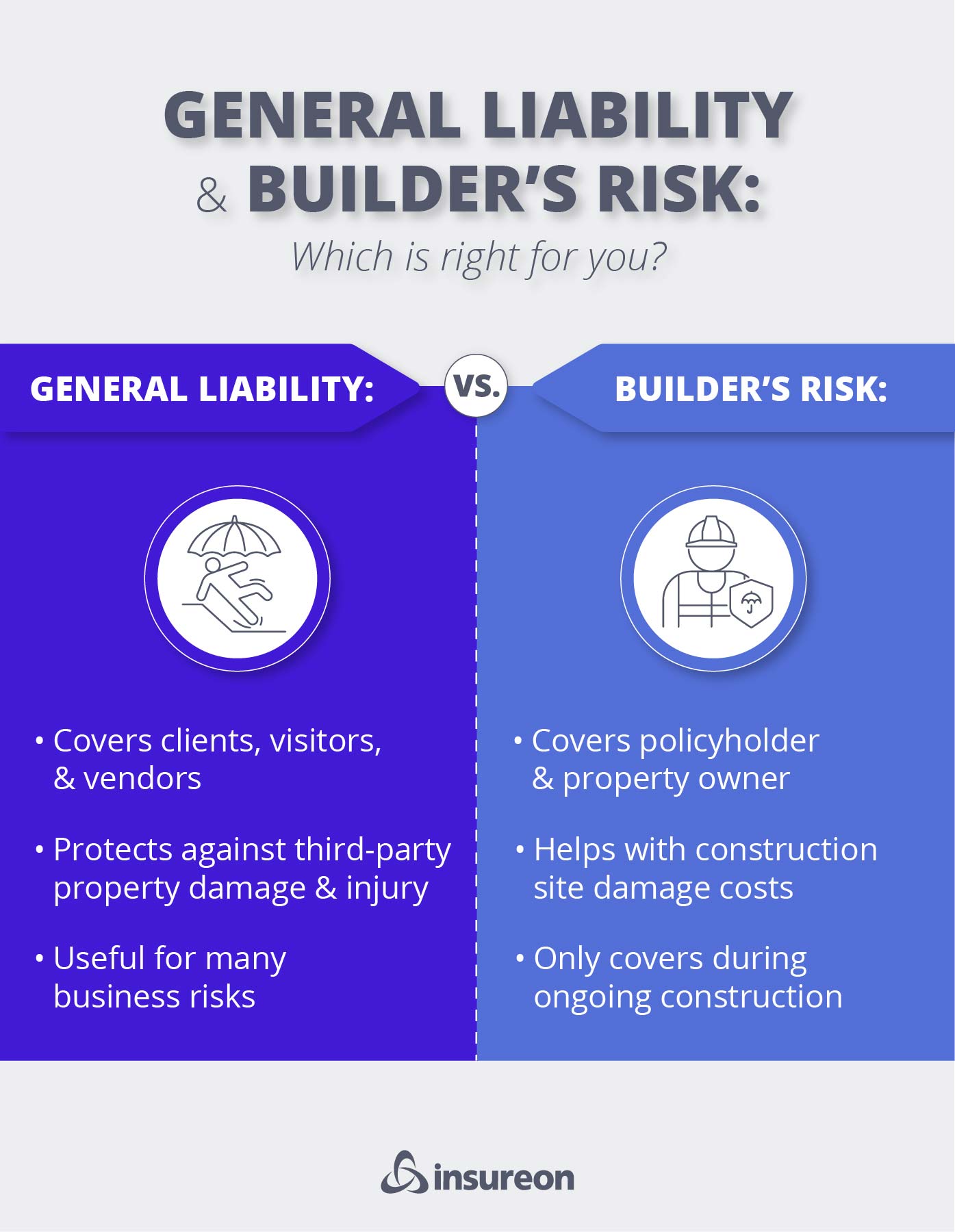
Builders risk vs. general liability insurance
While builder's risk insurance and general liability coverage are both used to protect small businesses, they cover different types of risks, property, and liabilities. Find out the differences between them and how they are critical for protecting your business operations.
What is builder's risk insurance?
General liability insurance provides protection from common liability claims made by third parties, or people outside your business.
Typically, this policy covers legal defense costs if someone sues over an injury, property damage, copyright infringement, or advertising injury. It can help pay for everything from legal fees to court-ordered judgments and settlements.
Specifically, general liability provides coverage for:

What is builder's risk insurance?
Builder's risk insurance, also called course of construction insurance, is a key policy in the construction industry that provides protection from financial loss due to non-severe weather events for a structure in progress during construction, as well as its materials.
This policy can help pay for repairs and debris removal in the event of a fire, replacing lumber stolen from a worksite, and fixing defective workmanship.
Specifically, builder's risk covers:
- Physical damage to the building under construction
- Temporary structures (like scaffolding)
- Loss or damage to building materials (on-site, in transit, or in storage)
- Vandalism and job-site theft

What's the difference between general liability and builder's risk insurance?
The difference between general liability insurance and builder's risk insurance is simple.
A general liability insurance policy protects small business owners against claims of property damage, bodily injury, or advertising injury on someone else's property. While builder's risk insurance only covers damages that occur at a construction site.
What is covered under each policy?
- General liability insurance covers others (clients, visitors, and vendors)
- Builder's risk insurance covers the policyholder and the property owner
For example, if a jobsite is damaged by theft, vandalism, or weather, the losses would be handled by a builder’s risk policy. However, if someone suffers a bodily injury while visiting the site, it would be covered under a general liability policy.
Both policies are an important part of a contractor's insurance risk management plan. Without them, they can be liable to third parties throughout the course of construction.
[video: an animated header displays the Insureon logo. Underneath it, a subheading displays the text: "Understanding policies with Insureon: General liability vs. Builder's risk insurance"]
MALE VOICEOVER: In the construction industry, small business owners often face unique risks as projects don't always run smoothly. There are two types of insurance coverage that construction businesses should have to protect themselves from unexpected claims and lawsuits. General liability insurance, and builder's risk insurance.
[video: an illustrated header displays the text: "Two types of coverage to help your business survive unexpected claims and lawsuits."]
[video: Under above header, two bullet points display the text: "General liability insurance"; "Builder's risk insurance"]
While both policies offer protection for your small business, they cover different types of risks. So what's the difference between general liability insurance and builder's risk coverage?
General liability insurance protects against common third-party claims or lawsuits from people outside your business, such as customer injuries, damage to client property, advertising injuries, and product liability claims.
[video: an illustrated header displays the text: "General liability protects against common third-party claims, such as:"]
[video: Under above header, three bullet points display the text: "Customer injuries and property damage"; "Personal and advertising injury"; "Product liability claims"]
On the other hand, builder's risk coverage, also called course of construction insurance, offers protection from financial loss due to non-severe weather events for a building or work site that's under construction.
[video: an illustrated header displays the text: "Builder's risk provides coverage at worksites for building or structures under construction."]
This includes physical damage to the building, and temporary structures, like scaffolding, loss or damage of building materials, and vandalism.
[video: an illustrated header displays the text: "Builder's risk guards against:"]
[video: Under above header, three bullet points display the text: "Physical damage to a building under construction and temporary structures"; "Loss or damage to building materials on-site, in transit, or in storage"; "Vandalism and job-site theft"]
So, who is covered by each policy? General liability insurance covers third-party individuals, such as clients, visitors, and vendors.
[video: an illustrated header displays the text: "General liability insurance covers clients, customers, visitors, and vendors."]
While builder's risk insurance covers the policy holder and the property owner.
[video: an illustrated header displays the text: "Builder's risk insurance covers the policyholder and the property owner."]
Does your business need both builder's risk and general liability insurance? That depends on several factors, such as if the project you're working on is new construction or a remodel, the project size and cost, client requirements, and your state licensing requirements.
[video: an illustrated header displays the text: "Whether you need both builder's risk and general liability coverage depends on:"]
[video: Under above header, three bullet points display the text: "New construction vs. remodel"; "Project size and cost"; "State licensing and client requirements"]
For example, in some states, general contractors are required to carry general liability in order to get their business license.
[video: an illustrated header displays the text: "Insurance and licensing requirements can vary by state."]
However, carrying both policies is a smart choice to fully protect your business from potentially expensive claims. It's best to speak with your insurance agent to understand which policies can meet both your business needs and your budget.
[video: an illustrated header displays the text: "Speak with your insurance agent to find the right policies for your small business."]
Get free insurance quotes for your small business with Insureon today.
[video: an illustrated white header displays the text: "Insureon is your #1 digital agency for small business insurance"]
Click the link to get started.
[video: an animated header displays the Insureon logo]
Insureon helps a wide range of businesses get the coverage they need from top-rated U.S. insurance carriers. Complete our easy online application to get free insurance quotes.
Our expert insurance agents can help you choose the best best general liability and/or professional liability policy that meets the needs of your small business.
You’ll typically be able to get coverage quickly and receive a copy of your insurance certificate on the same day.
Do you need both builder's risk and general liability insurance?
Ultimately, whether or not your business is required to have both builder's risk and general liability will depend on several things. This includes if it's new construction or a remodel, project size, cost, and client requirements.
However, carrying both policies is a smart choice to protect both your business, as well as any subcontractors involved in the construction project from all potential exposures. General liability and builder's risk work together to fully protect your business from potentially expensive liability claims.
Top professions that need builder's risk insurance
Don't see your profession? Don't worry. We insure most businesses.
When should I file a claim with my builder’s risk coverage vs. general liability insurance?
You should file a claim with your builder's risk coverage when damage occurs directly to the building under construction. While you should file a claim with your general liability insurance when someone else's property is damaged or a third-party is injured due to your project.
When a situation arises where coverage overlaps, filing a claim on your builder's risk policy may help keep your general liability claims history clean with your insurer. This would help keep your insurance premiums low on your general liability insurance.
Business owner’s policy
Workers’ compensation insurance
Professional liability insurance
Surety bonds
Tools and equipment insurance
Protect your business with the right insurance policies with Insureon
It's easy to get free quotes for general liability and builder's risk insurance coverage with Insureon. We'll ask for basic facts about your business to help find the right coverage to match your risks, budget, and state requirements.
For most policies, you can get quotes through our online application. If you're not sure what types of insurance policies your business needs, you can speak with a licensed insurance agent. Once you choose your insurance products, you can usually get coverage and your certificate of insurance within 24 hours.
























